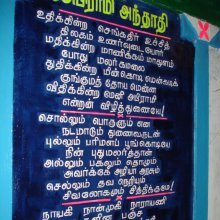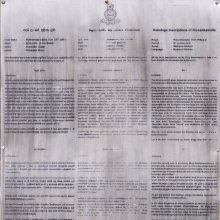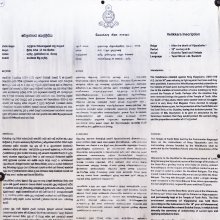Potu, Potugarike: 6 definitions
Introduction:
Potu means something in Hinduism, Sanskrit, biology, Tamil. If you want to know the exact meaning, history, etymology or English translation of this term then check out the descriptions on this page. Add your comment or reference to a book if you want to contribute to this summary article.
Images (photo gallery)
Biology (plants and animals)
Source: Google Books: CRC World Dictionary (Regional names)Potu in Upper Volta is the name of a plant defined with Calotropis procera in various botanical sources. This page contains potential references in Ayurveda, modern medicine, and other folk traditions or local practices It has the synonym Apocynum syriacum S.G. Gmel. (among others).
Example references for further research on medicinal uses or toxicity (see latin names for full list):
· Botanische Jahrbücher für Systematik, Pflanzengeschichte und Pflanzengeographie (1903)
· Notes from the Royal Botanic Garden, Edinburgh (1980)
· Bulletin de la Société Botanique de France (1918)
· Revisio Generum Plantarum (1891)
· Annals of the Missouri Botanical Garden (1930)
· Journal of South China Agricultural University (1991)
If you are looking for specific details regarding Potu, for example health benefits, extract dosage, diet and recipes, side effects, pregnancy safety, chemical composition, have a look at these references.

This sections includes definitions from the five kingdoms of living things: Animals, Plants, Fungi, Protists and Monera. It will include both the official binomial nomenclature (scientific names usually in Latin) as well as regional spellings and variants.
Languages of India and abroad
Sanskrit dictionary
Source: Cologne Digital Sanskrit Dictionaries: Monier-Williams Sanskrit-English DictionaryPotu (पोतु):—m. (√1. pū) = mānabhāṇḍa-śo-dhaka, [cf. Lexicographers, esp. such as amarasiṃha, halāyudha, hemacandra, etc.]
[Sanskrit to German]
Sanskrit, also spelled संस्कृतम् (saṃskṛtam), is an ancient language of India commonly seen as the grandmother of the Indo-European language family (even English!). Closely allied with Prakrit and Pali, Sanskrit is more exhaustive in both grammar and terms and has the most extensive collection of literature in the world, greatly surpassing its sister-languages Greek and Latin.
Kannada-English dictionary
Source: Alar: Kannada-English corpusPōṭu (ಪೋಟು):—[noun] = ಪೋಟೆ [pote]1.
--- OR ---
Pōṭugārike (ಪೋಟುಗಾರಿಕೆ):—[noun] = ಪೋಕರಿತನ [pokaritana].
--- OR ---
Pōtu (ಪೋತು):—[noun] = ಪೋತ [pota]1.
Kannada is a Dravidian language (as opposed to the Indo-European language family) mainly spoken in the southwestern region of India.
Tamil dictionary
Source: DDSA: University of Madras: Tamil LexiconPotu (பொது) [potutal] perhaps from 4 intransitive verb To be perforated; துளைபடுதல். மரம்பொதச் சரந் துரந்து [thulaipaduthal. marambothas saran thuranthu] (நாலாயிர திவ்யப்பிரபந்தம் திருச்சந். [nalayira thivyappirapandam thiruchan.] 73).
--- OR ---
Potu (பொது) [potuttal] 11 transitive verb Causative of பொது¹- [pothu¹-]
1. To bore; துளைத்தல். புட்கள் பொதுத்த புலால் வெண்டலை [thulaithal. pudkal pothutha pulal vendalai] (பதினொராந்திருமுறை மூத்த. [pathinorandirumurai mutha.] 3).
2. To pierce, prick; முள் முதலியன பாய்தல். கப்பணம் கால்களைப் பொதுக்கும்படி [mul muthaliyana paythal. kappanam kalkalaip pothukkumbadi] (பத்துப்பாட்டு: மதுரைக்காஞ்சி [pathuppattu: mathuraikkanchi] 598, உரை [urai]).
--- OR ---
Potu (பொது) noun [Telugu: pottu, M. podu.]
1. That which is common or shared by many; generality, opposed to ciṟappu; பொதுமை யானது. பொதுநோக்கான் வேந்தன் வரிசையா நோக்கின் [pothumai yanathu. pothunokkan venthan varisaiya nokkin] (திருக்குறள் [thirukkural], 528).
2. Lack of distinction; சிறப்பின்மை. பொதுக்கொண்ட . . . வதுவை [sirappinmai. pothukkonda . . . vathuvai] (கலித்தொகை [kalithogai] 66).
3. That which is ordinary or general; சாதாரணம். பொதுவின் மன்னுயிர்க் குலங்களும் [satharanam. pothuvin mannuyirk kulangalum] (கம்பராமாயணம் வருணனை. [kambaramayanam varunanai.] 30).
4. That which is usual or natural; சகசம். உரை பொதுவே [sagasam. urai pothuve] (கம்பராமாயணம் முதற். [kambaramayanam muthar.] 172).
5. Neutrality; நடுவுநிலை. அவன் எந்தப் பக்கத்திலுஞ் சேராது பொதுவாயிருக் கிறான். [naduvunilai. avan enthap pakkathilugn serathu pothuvayirug kiran.]
6. Likeness, equality; ஒப்பு. ஒன்றொடு பொதுப்படா வுயர் புயத்தினான் [oppu. onrodu pothuppada vuyar puyathinan] (கம்பராமாயணம் நாகபாச. [kambaramayanam nagapasa.] 75).
7. Vagueness; குறிப்பான பொருளின்மை. [kurippana porulinmai.] Colloq.
8. That which is public; பகிரங்கமானது. [pagirangamanathu.] (W.)
9. Public place, assembly; மன்று. பொது விற் றூங்கும் விசியுறு தண்ணுமை [manru. pothu vir rungum visiyuru thannumai] (புறநானூறு [purananuru] 89).
10. The hall in the temple at Chidambaram; தில்லை யம்பலம். கோலமார் தருபொதுவினில் வருகென [thillai yambalam. kolamar tharupothuvinil varugena] (திருவாசகம் [thiruvasagam] 2, 128).
--- OR ---
Pōṭu (போடு) [pōṭutal] 6 transitive verb
1. To cast down, throw a short distance; to cast away; எறிதல். பூத்த கடுக்கையைச் சிறிதும் போடா [erithal. putha kadukkaiyais sirithum poda] (இரகுவமிசம் ஆற்று. [iraguvamisam arru.] 19).
2. To put, set in a position, apply, lay; இடுதல். புல்லாயினு மொருபச்சிலையா யினும் போட்டிறைஞ்சி [iduthal. pullayinu morupachilaiya yinum pottirainchi] (தாயுமானசுவாமிகள் பாடல் பாயப்புலி. [thayumanasuvamigal padal payappuli.] 31).
3. To fasten, as a bolt; தாழ் முதலியன இடுதல். கதவு போட்டாயிற்றா [thazh muthaliyana iduthal. kathavu pottayirra]?
4. To put on, as ornaments; தரித்தல். வயிரமாலை பொலியப் போட்டு [tharithal. vayiramalai poliyap pottu] (இரகுவமிசம் இலவண. [iraguvamisam ilavana.] 40).
5. To bring forth, as animals; to put forth, yield, as fruit-trees; ஈனு தல். வாழை குலை போட்டது. [inu thal. vazhai kulai pottathu.]
6. To bring out; to publish; அச்சிட்டு வெளிப்படுத்துதல். புஸ்தகம் போட்டான். [achittu velippaduthuthal. pusthagam pottan.]
7. To work, as a sum; கணக்குச் செய்தல். [kanakkus seythal.] Colloq.
8. To draw, as a figure; வரை தல். [varai thal.] Colloq.
9. To serve, as food; to pour, as a drink; பரிமாறுதல். [parimaruthal.] Colloq.
10. To strike; to stamp; to beat, as a drum; அடித்தல். செருப்பா லொருவன் போடானோ [adithal. seruppa loruvan podano] (தனிப்பாடற்றிரட்டு [thanippadarrirattu] i, 41, 80).
11. To sow, plant; விதைத்தல். [vithaithal.]
12. To use, as tobacco; to be addicted to; உபயோகித்தல். புகையிலை போடுகிறவன். [upayogithal. pugaiyilai podugiravan.]
13. To drink, as toddy; கள் முதலி யன குடித்தல். [kal muthali yana kudithal.] Colloq.
14. To lose; to drop; விடுத்தல். வீரமுங் களத்தேபோட்டு [viduthal. viramung kalathepottu] (கம்பராமாயணம் கும்பக. [kambaramayanam kumbaga.] 1). 15 To pay, subscribe, invest; பண முதலி யன கட்டுதல். பணம் போட்டு வாங்கினான். [pana muthali yana kattuthal. panam pottu vanginan.]
16. To cast, as lots; to allot; பிரித்து இடுதல். சீட்டுப் போடு. [pirithu iduthal. sittup podu.] — intransitive To become, form; உண்டாதல். [undathal.] (W.) — aux. An auxiliary verb; ஒரு துணைவினை. அவன் செய்து போட்டான். [oru thunaivinai. avan seythu pottan.]
--- OR ---
Pōṭu (போடு) noun < போடு-. [podu-.]
1. Anything striking or impressive, as a speech; எடுப்பாயுள் ளது. அவன் ஒரு போடு போட்டான், எல்லாரும் ஒடுங் கினார்கள். [eduppayul lathu. avan oru podu pottan, ellarum odung kinarkal.]
2. Luck; அதிருஷ்டம். [athirushdam.]
--- OR ---
Pōṭu (போடு) noun [Telugu: bōḍu, K. bōḷu.] Baldness, shaven condition; மொட்டை. [mottai.] Local usage
--- OR ---
Pōṭu (போடு) noun
1. A kind of oven. See கோட்டையடுப்பு. [kottaiyaduppu.] Local usage
2. Hole, opening, cleft; பொந்து. வயல் வரப்பில் போடுபாய்ந்திருப்பல்லாண்டு பதால் பாய்ச்சின நீர் நிற்பதில்லை. [ponthu. vayal varappil podupaynthirup pathal paychina nir nirpathillai.]
--- OR ---
Pōtu (போது) [pōtutal] 5 intransitive verb
1. To be adequate; to suffice; போதியதாதல். உலகமெலா முரல் போதாதென்றே [pothiyathathal. ulagamela mural pothathenre] (திருவாசகம் [thiruvasagam] 9, 6).
2. To be competent, fit, proper; to be adapted, suitable; தகுதியாதல். [thaguthiyathal.] (W.)
3. To be respectable; மதிக்கப் படுதல். [mathikkap paduthal.] (W.)
--- OR ---
Pōtu (போது) [pōtutal] 13 intransitive verb [Conjugating only in present and future tenses, as போது கின்றான், போதுவான் [pothu kinran, pothuvan] < போ-. [po-.]
1. To go, pass, proceed; செல்லுதல். போது நான் வினைக்கேடன் [selluthal. pothu nan vinaikkedan] (திருவாசகம் [thiruvasagam] 5, 22).
2. To conduct oneself, behave; ஒழுகுதல். அறனை யறிந்து போதுதல் . . . சான்ற வர்க்கெல்லாம் முறைமை [ozhuguthal. aranai yarinthu pothuthal . . . sanra varkkellam muraimai] (கலித்தொகை [kalithogai] 139, 2, உரை [urai]).
--- OR ---
Pōtu (போது) noun perhaps from போது²-. [pothu²-.] cf. bōdha.
1. Flower bud ready to open; மலரும்பருவத் தரும்பு. காலையரும்பிப் பகலெல்லாம் போதாகி [malarumbaruvath tharumbu. kalaiyarumbip pagalellam pothagi] (திருக்குறள் [thirukkural], 1227).
2. Flower; மலர். (திவா.) போதார் கூந்தல் [malar. (thiva.) pothar kunthal] (புறப்பொருள்வெண்பாமாலை [purapporulvenpamalai] 12, இருபாற். [irupar.] 5, கொளு [kolu]).
3. Freshness, beauty; செவ்வி. [sevvi.] (திருவிருத்தம் [thiruvirutham] 76, அரும். பக். [arum. pag.] 389.)
--- OR ---
Pōtu (போது) cf. போழ்து. [pozhthu.] noun [Old Kanarese pōḻtu.] See பொழுது [pozhuthu], 1, 2, 3. (சூடாமணிநிகண்டு) போதுஞ் சென் றது குடபால் [(sudamaninigandu) pothugn sendamizhppathirigai rathu kudapal] (கம்பராமாயணம் வனம்புகு. [kambaramayanam vanambugu.] 19). — adverb When, while, during the time that; பொழுதில். ஆட் கொண்டபோதே கொண்டிலையோ [pozhuthil. ad kondapothe kondilaiyo] (திருவாசகம் [thiruvasagam] 33, 7).
--- OR ---
Pōṭu (போடு) noun < போடு-. [podu-.] Stroke; அடி. அன்றேயோர் போடா யறைய வெழுங்கால் [adi. anreyor poda yaraiya vezhungal] (பஞ்சதந்திரப் பாடற் திருமுக. [panchathandirap padar thirumuga.] 745).
Tamil is an ancient language of India from the Dravidian family spoken by roughly 250 million people mainly in southern India and Sri Lanka.
See also (Relevant definitions)
Starts with (+70): Potu chettu, Potu tana, Potu-arucirappu, Potu-bonchi, Potu-gally-gista, Potu-veduru, Potua, Potubaghi, Potubilu, Potubokada, Potubokkada, Potubukkedi, Potucamanti, Potuccelavu, Potuccir, Potuccom, Potuccuttiram, Potuchaamanti, Potugalligeetsa, Potugalligista.
Ends with (+157): A-potaikkappotu, Acaipotu, Acarappotu, Alakupotu, Am-ppotu, Anai-kattipotu, Antaipotu, Appotu, Arai-kanpotu, Avaiyampotu, Canipotu, Capatampotu, Catankampotu, Catcipotu, Celaipotu, Cippuppotu, Ciranipotu, Cirpotu, Cittuppotu, Cokampotu.
Full-text (+484): Pottampotu, Potrin, Potujanam, Potukkunam, Potukkuttam, Potuncatci, Potutati, Potukatu, Maippotu, Potuvaikutal, Potumattiyam, Nayirupotu, Potuvarivu, Potumatantai, Onroli-potucol, Potunayakam, Acu-potumakkal, Potum, Potupokku, Pottatuppu.
Relevant text
Search found 4 books and stories containing Potu, Pōṭu, Potugarike, Pōṭugārike, Pōtu, Pothu, Podu, Podhu, Paodu, Paothu; (plurals include: Potus, Pōṭus, Potugarikes, Pōṭugārikes, Pōtus, Pothus, Podus, Podhus, Paodus, Paothus). You can also click to the full overview containing English textual excerpts. Below are direct links for the most relevant articles:
Tiruvaymoli (Thiruvaimozhi): English translation (by S. Satyamurthi Ayyangar)
Pasuram 2.4.9 < [Section 4 - Fourth Tiruvaymoli (Ati ati)]
Pasuram 3.1.6 < [Section 1 - First Tiruvaymoli (Mutic coti)]
Pasuram 2.10.10 < [Section 10 - Tenth Tiruvaymoli (Kilar oli ilamai)]
Sivaprakasam (Study in Bondage and Liberation) (by N. Veerappan)
Liberation of self in Shaiva Siddhanta < [Chapter 7 - Liberation]
Author (Umapati Shivam) and his Works < [Chapter 1 - Introduction]
Atharvaveda and Charaka Samhita (by Laxmi Maji)
Unmāda (insanity) according to Caraka < [Chapter 4 - Diseases and Remedial measures (described in Caraka-saṃhitā)]
The Religion and Philosophy of Tevaram (Thevaram) (by M. A. Dorai Rangaswamy)
Chapter 1 - The Tondar or Tontar (devotees) and their religion < [Volume 4.1.2 - The conception of Paramanaiye Paduvar]




